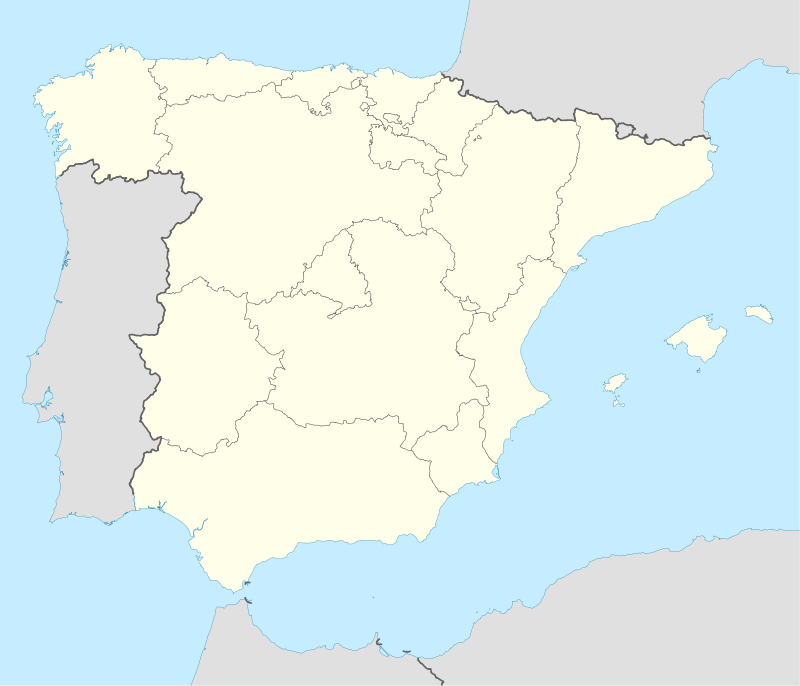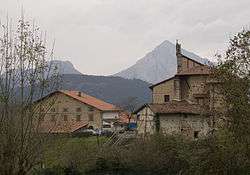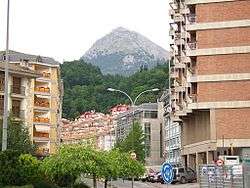Mondragón
| Mondragón | ||
|---|---|---|
| Municipality | ||
| Arrasate / Mondragon | ||
|
The town centre of Mondragón. | ||
| ||
 Mondragón  Mondragón Location of Mondragón within the Basque Country and within Spain | ||
| Coordinates: 43°3′56.59″N 2°29′24.42″W / 43.0657194°N 2.4901167°W | ||
| Country | Spain | |
| Autonomous Community | Basque Country | |
| Province | Gipuzkoa | |
| Comarca | Debagoiena | |
| Founded | May 15, 1260 | |
| Barrios |
List
| |
| Government | ||
| • Type | Ayuntamiento | |
| • Mayor | María Ubarretxena Cid (PNV) | |
| Area | ||
| • Total | 30.80 km2 (11.89 sq mi) | |
| Population (2012)INE | ||
| • Total | 22,027 | |
| • Density | 715.16/km2 (1,852.3/sq mi) | |
| Time zone | CET (GMT +1) | |
| • Summer (DST) | CEST (GMT +2) (UTC) | |
| Post code | 20500 | |
| Area code(s) | +34 943 | |
| Website | http://www.arrasate.eus | |
Mondragón (Basque: Arrasate or Mondragoe), officially known as Arrasate/Mondragón is a town and municipality in Gipuzkoa province, Basque Country, Spain. Its population in 2015 was 21,933.
Economic and historical significance
The town is best known as the birthplace of the Mondragón Cooperative Corporation (MCC), the world's largest worker cooperative, whose foundation was inspired in the 1940s by the Catholic priest José María Arizmendiarrieta. In 2002 the MCC contributed 3.7% towards the total GDP of the Basque Country and 7.6% to the industrial GDP.
The valley of the High Deba where the town is located enjoyed a high level of employment in the 1980s while the rest of the Basque industrial areas suffered from the steel crisis.
Noted poverty expert and sociology professor Barbara J. Peters of Southampton College, Long Island University, has studied the incorporated and entirely resident-owned town of Mondragón. "In Mondragón, I saw no signs of poverty. I saw no signs of extreme wealth," Peters said. "I saw people looking out for each other…..It's a caring form of capitalism.”[1]
The spa at Santa Águeda (now a psychiatric hospital) was the location of the 1897 murder of Spanish politician Antonio Cánovas del Castillo by Michele Angiolillo.
Mondragón University
Mondragón serves as base of Mondragón University, a private university created in 1997, that is heavily connected with the MCC companies. Almost all of the university's graduates find their first job within three months after completing their studies due to this strong link.
Mondragón University is divided into engineering, humanities and enterprise faculties. The faculty of engineering is in Mondragon and Goierri. The humanities faculty is in Eskoriatza and the enterprise faculty is in Bidasoa and Oñati.
The student enrollment is approximately 3,500 and is rapidly growing. The majority of the students are from Gipuzkoa and surrounding villages, although in the last few years, the number of students from Bilbao, San Sebastián and the Basque Country capital, Vitoria-Gasteiz, has increased significantly.
In film
Pierre Boutron's French language film Fiesta!,[2] adapted from a novel written by José Luis de Vilallonga, was set in Mondragón during the Spanish Civil War.

Archaeology
Excavating at the Artazu VII site located in the Kobate Quarry in Arrasate.[3]
References
External links
- General information of Arrasate/Mondragón (Spanish)
- Pictures of Arrasate/Mondragón in FLICKR
- Municipality pages in Basque and Spanish
- Mondragon University homepage
- ARRASATE/MONDRAGÓN in the Bernardo Estornés Lasa - Auñamendi Encyclopedia (Euskomedia Fundazioa) Information available in Spanish
| Wikimedia Commons has media related to Arrasate. |
Coordinates: 43°3′56.59″N 2°29′24.42″W / 43.0657194°N 2.4901167°W


